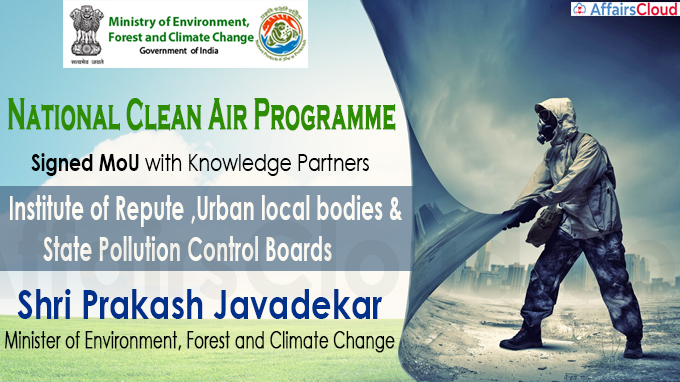 On March 26, 2021, Representatives of State Pollution Control Boards, Urban Local Bodies & Institutes of Repute (IoR) for 132 identified cities signed a Memorandum of Understanding (MoU) for implementation of city specific action plans under National Clean Air Programme (NCAP). The MoU was signed in the presence of Prakash Javadekar, Union Minister of Environment, Forest & Climate Change.
On March 26, 2021, Representatives of State Pollution Control Boards, Urban Local Bodies & Institutes of Repute (IoR) for 132 identified cities signed a Memorandum of Understanding (MoU) for implementation of city specific action plans under National Clean Air Programme (NCAP). The MoU was signed in the presence of Prakash Javadekar, Union Minister of Environment, Forest & Climate Change.
- 82 Knowledge Partners & Institutes of Repute (IITs, CSIR labs & State Engineering Colleges) have been roped in to help the 132 Non-Attainment cities implement their action plans for reducing air pollution.
- A National Knowledge Network consisting of leading air quality specialists has been constituted as a technical advisory group for supporting activities under NCAP. It will also guide local Institutes of Repute (IoRs) in conducting air quality research.
- NCAP, a national level strategy aims to tackle air pollution by achieving 20%-30% reduction in Particulate Matter concentrations(i.e. PM2.5 and PM10) in at least 102 cities by 2024 (with 2017 as base year).
- During the event, an agreement was signed between Noida & Ghaziabad, Uttar Pradesh with IIT Delhi. IIT Delhi will act as a knowledge partner to help the cities achieve their target.
132 Non-Attainment Cities
- Non- Attainment Cities are the cities which do not meet the National Ambient Air Quality Standards.
- Such cities include Delhi, Mumbai, Nagpur, Ahmedabad, Kolkata, Agra, Kanpur, Varanasi, Bengaluru, Noida, Ghaziabad, Bhopal, Chandigarh, Patna and others in the list of 132.
- NCAP aims to reduce air pollution in these cities through expansion of air quality network, source apportionment studies, public awareness, grievance redressal mechanism & sector specific action points.
National Clean Air Programme (NCAP):
- It was launched in 2019 by MoEFCC.
- It is the 1st ever effort in India to frame a national framework for air quality management with a time-bound reduction target.
- So far, INR 336 crore has been disbursed to State Pollution Control Boards under NCAP.
e-Buses under FAME Scheme
During the event, Prakash Javadekar urged the state governments to procure e-buses for public transport purposes under the FAME India scheme (Faster Adoption and Manufacturing of (Hybrid &) Electric Vehicles in India).
- Government has allocated 6000 e-buses to different cities across India, of which 600 have been procured and are operational.
- The FAME scheme launched in 2015 as a part of the National Electric Mobility Mission Plan. It is monitored by the Department of Heavy Industries, the Ministry of Heavy Industries and Public Enterprises.
Recent Related News:
i.August 10, 2020, Bihar State Pollution Control Board (BSPCB) has signed a MoA with IIT Delhi to set up a Geographical Information System (GIS) based platform for air quality management in Bihar.
About Ministry of Environment, Forest & Climate Change (MoEFCC):
Union Minister – Prakash Javadekar (Rajya Sabha MP from Maharashtra)
Minister of State – Babul Supriyo (Lok Sabha MP, Constituency – Asansol, West Bengal)




